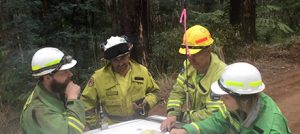Australia should urgently accept that bushfire prevention rather than suppression is the only way to avoid the widescale loss of lives, property and biodiversity experienced last summer according to the Institute of Foresters of Australia and Australian Forest Growers (IFA/AFG). Source: Timberbiz
The peak organisation representing more than 1000 professional and scientific forest land managers have stressed the need to prioritise broadscale fire preparedness instead of expensive and sometimes unreliable fire suppression tools as they put forward their submission to the Bushfire Royal Commission.
IFA/AFG president Bob Gordon said the IFA/AFG was deeply concerned the current focus of Australia’s forest fire management on fire suppression instead of prescribed burning that reduces flammable forest fuels had led to devastating consequences.
“Prioritising fire suppression activities while failing to effectively reduce fuel levels through prescribed burning has unintentionally increased human and wildlife deaths, caused greater damage to assets, increased environmental degradation and led to spiralling total fire costs,” Mr Gordon said.
“Despite previous Royal Commissions recommending a greater focus on fire prevention and preparedness including prescribed burning, we have seen expenditures on fire suppression, especially aircraft related activities skyrocket relative to expenditure on fire prevention activities.
“While in the short-term a fire suppression focus drives down the area burnt by wildfire, over time it allows forest fuel levels to increase over the majority of the forest, thereby increasing the intensity of wildfires when they occur, and in turn the human, environmental and economic costs incurred.
“It is imperative Government turns their attention towards managing forest fuel levels across the entire forested landscape if the number and costs of wildfires are to be reduced.”
The IFA/AFG’s submission put forward 25 recommendations in response to the Commission’s terms of reference, including prioritising prevention and amelioration measures such as off-season fuel reduction burning, maintaining strong forestry and timber industry sectors in rural areas in order to have experienced and skilled forest managers on hand to mount early attacks on firefronts as they emerge and developing performance measures to align and regulate the activities of each state and territory.
Mr Gordon said the IFA/AFG welcomed the Royal Commission but stressed the importance of its final recommendations being implemented.
“The Royal Commission is a welcome opportunity for stakeholders to have some influence on long overdue improvements to forest fire management in Australia,” Mr Gordon said.
“However, we have made submissions to many previous bushfire inquiries throughout Australia and subsequently watched in concern as recommended changes have not been fully implemented.
“One of the IFA/AG’s recommendations calls for the Commonwealth Government to audit the implementation of the 58 bushfire inquiries, reviews and Royal Commissions held since 1939.
“Unfortunately, you can’t minimise the impact of wildfire with words alone and It’s imperative that real action starts being taken now.
“Active forest management can play a vital role in increasing Australia’s capacity to mitigate the social, environmental and economic costs of future bushfire seasons.
“Maintaining a strong native forest timber industry is integral to reducing the risk of catastrophic wildfire events, which is more important than ever as Australia faces hotter and drier conditions as a result of climate change.
“This fire benefit is two pronged. Firstly, active forest management significantly reduces potential fuel loads of fires and secondly, having experienced forest managers and contractors on the ground and equipped with the skills, resources and knowledge of local landscapes to mount rapid attacks is an ideal first response to any fire outbreaks.”






